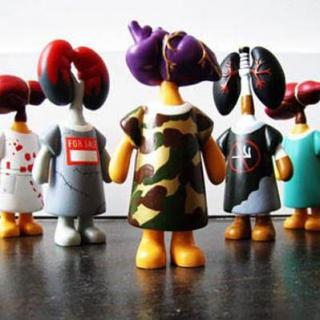
介绍:
Heyang: 大家好,欢迎来到这周Round Table的英语词汇小百科节目,我是Heyang,Mark会跟我一起聊一聊关于器官的那些事。We are going to talk about organs and the phrases related to that, and often it sounds a little bit religious and biblical sometimes. But anyway, let’s go into it.
Mark: Okay, what are we gonna start with?
Heyang: What about this phrase, “a man after my own heart”? It sounds like you are professing your love to someone. Is that what it means?
Mark: Do you know, I mean I’ve known this phrase ever since I was a little boy learning English. But, you know, I’ve never thought of it in that way before. Yeah, “a man after my own heart” is the sort of thing that, maybe a woman might say or something like that. It doesn’t mean that at all. I mean, what it means is someone that has the same sort of ideas as you. For example, I mean, you know, if you love football, for example, and your friend loves football, then you can say “Oh yeah, he’s a man after my own heart”, meaning that he follows the things that your heart follows in the same way.
Heyang:那也就是说,这是一个合我意的人,跟什么爱情啊表白啊没有任何的关系。What about another phrase, which I think we see it more often, saying that something costs someone “an arm and a leg”.
Mark: Yes, well that’s very, very interesting what I mean, you know, obviously the things that we would least like to give up, you know, if we were buying something, is part of our own body. So, that’s why this is quite a shocking one, really. If something’s really high-priced in a shop, you can say “Look at that! It would cost an arm and a leg to buy it.”
Heyang: Or maybe a kidney to get an iPhone.
Mark: Well, it’s happened, unfortunately, hasn’t it? And the other thing is, if we go back 500 years to the works of William Shakespeare, then Shakespeare wrote a play called The Merchant of Venice, which featured a character called Shylock. Shylock used to lend money out to people, and there was one particular man that he lent the money to. When this man couldn’t pay it back, the deal was that that man would give Shylock one pound of flesh.
Heyang: Ouch!
Mark: Now, that could have been an arm or a leg. But of course Shylock wanted his heart, obviously therefore wanted his life. So, that’s another reference in literature to this idea of giving away part of your body. In this case, in payment to the debt. I won’t tell you how the story ended, because it’s one of the great plays. And there’s a really great film version online, which stars Jeremy Irons, a great British actor, not as Shylock, but he’s the role of the man that borrowed the money.
Heyang: Yes, and I do love his voice too, as he was Scar in the Lion King. A pound of flesh means something which is owed that is ruthlessly required to be paid back. Pound of flesh,一磅肉,这个意思呢,也是形容以借款人的惨重损失和痛苦为代价的债务。也可以说是合法却极不合理的要求。来自《威尼斯商人》,也是莎士比亚的名剧之一。You can check that out.
Mark: And even now, say a husband and wife have been arguing, and then the wife continues to argue, even when the man thinks that he’s, you know, done all he can to calm her down. He might leave, go out and visit some of his friends. And he would use the phrase today, still used today, he’d say, “You know, I mean I kept apologizing to her, but she wanted her pound of flesh”. Meaning that she just wouldn’t let it go, and she wanted to extract everything she could from him.
Heyang: Or maybe it’s because he did something really terrible in the first place, and what the lady should have said is “go and boil your head”!
Mark: That sounds horrible, some of these are really horrible. Do you know, the one I hate would take about go and boil your head, I mean that’s a horrible image, isn’t it? Someone boiling their head.
Heyang: That means in Chinese, “滚!” It’s not a good word or phrase to use.
Mark: It’s a really horrible one, isn’t it? And the other one I hate is, a lot of American show-biz people say this, “Eat your heart out”.
Heyang: Ewwww…
Mark: I think that’s the most… I think that’s actually obscene imagery. I can’t stand even the thought of thinking about that phrase, but you hear it all the time…
Heyang: What does it mean, by the way?
Mark: It means, say for example at the Oscars, if one actor has got one an Oscar, and the others thought they were going to win but they didn’t, that one that want it in a very bitter and kind of nasty kind of way, can say, “eat your heart out”, you know, meaning “too bad on you”, “I’m better than you”, that’s what it means, you know. It’s when you achieve something, and the other people don’t. And maybe they’ve been criticizing you before, and you’ve proved them wrong or something like that. So, personally I can’t stand the phrase, I think it’s a horrible visual imagery. I mean, it’s like something out of the Walking Dead.
Heyang: It’s all the time we have for this week’s 英语词汇小百科,we’ll see you next week!
大家还在听

